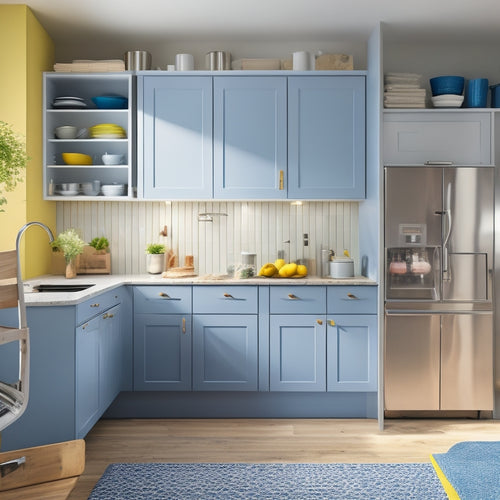
Essential Care Guide for Your Little One
Share
Caring for your little one requires attention to detail and a thorough approach. Proper sterilization and cleaning are important for maintaining a safe environment, while correctly preparing bottles and following recommended feeding guidelines guarantee healthy meals. Effective soothing techniques and introducing solid foods at 6 months support growth and development. As your child moves into toddlerhood, parenting tips and essential items like soft-tip spoons and healthy snacks become essential. By prioritizing these essential practices, you'll be well-equipped to navigate the journey of nurturing and caregiving. Discover the specific strategies and techniques to support your child's growth and thrive.
Key Takeaways
• Develop a regular cleaning routine and choose the right sterilization method to maintain a safe environment for your little one.
• Correctly prepare bottles by following recommended guidelines and maintaining cleanliness of feeding accessories for safe and healthy meals.
• Prioritize nutritious feeding, introduce solid foods at 6 months, and establish a feeding schedule for healthy growth and development.
• Use effective soothing techniques, and consider breastfeeding or formula feeding options to ensure your child's comfort and nutrition.
• Stay prepared for toddlerhood with parenting tips, soft-tip utensils, healthy snacks, and a well-stocked diaper bag with essentials.
Caring for Your Baby's Essentials
When it comes to caring for your baby's essentials, proper sterilization and cleaning are essential steps in maintaining a safe and healthy environment for your little one.
Developing a regular cleaning routine and choosing the right sterilization method can be overwhelming, but don't worry, we're here to help! From microwave sterilizer bags to deluxe sterilizers, we'll guide you through the best practices for sanitizing feeding accessories, bottles, and more.
When it comes to bottle preparation, it's important to get it right. We'll walk you through the simplest and most effective ways to prepare bottles, ensuring your baby's meals are always safe and healthy.
Nourishing and Soothing Your Child
Proper feeding and soothing techniques are vital for your child's growth and development, and mastering these skills can make all the difference in their overall well-being. As a parent, it's important to prioritize nutritious feeding and develop effective soothing techniques to guarantee your child's comfort and happiness.
| Nourishing Your Child | Soothing Techniques |
|---|---|
| Breastfeeding or formula feeding | Swaddling and cuddling |
| Offering a pacifier or comfort object | Creating a calming environment |
| Introducing solid foods at 6 months | Using white noise or lullabies |
| Maintaining a feeding schedule | Practicing skin-to-skin contact |
| Preparing healthy snacks and meals | Establishing a bedtime routine |
Toddlerhood and Beyond Essentials
As your child progresses into toddlerhood, establishing a routine that incorporates essential care items and practices becomes crucial for their continued growth and development.
During this phase, toddler development accelerates, and parenting tips become important for guiding through the ups and downs.
Essential toddler products, such as soft-tip spoons and soft-grip forks, make mealtime a breeze. Healthy snacks, like mashed fruits and veggies, fuel their energy and support their growth.
As they explore and learn, a well-stocked diaper bag with essentials like toothbrushes and baby care items guarantees you're always prepared.
By incorporating these must-haves into your daily routine, you'll be well on your way to raising a happy, healthy, and thriving toddler.
Frequently Asked Questions
How Often Should I Replace My Baby's Pacifier?
"When to replace a pacifier? Every 1-3 months or sooner if damaged. Prioritize Pacifier Hygiene to prevent germ buildup. Consider Pacifier Alternatives, like the Lovey Pacifier and Teether Holder, to promote healthy oral habits and reduce reliance on pacifiers."
What's the Ideal Storage Temperature for Breast Milk?
When storing breast milk, it's important to prioritize milk safety. Ideally, store expressed milk in the refrigerator at 39°F (4°C) or below, or in the freezer at 0°F (-18°C) or below, using a breast pump and airtight containers to guarantee excellent preservation.
Can I Use a Microwave to Heat up Baby Food?
'A sizzling hot topic! When it comes to heating baby food, microwave safety is paramount. Avoid microwaving altogether, as it can create hotspots, leading to uneven food temperatures, and instead opt for a gentle, controlled heat source to guarantee a safe and nutritious meal.'
How Do I Prevent Nipple Confusion With Bottle Feeding?
To prevent nipple confusion, guarantee a proper Breast Flow by holding the bottle at a comfortable Bottle Angle, allowing the baby to latch easily, and monitor for signs of frustration or discomfort during feeding.
Are Baby Teethers Dishwasher Safe?
When it comes to teether safety, parallel concerns arise: are they dishwasher safe? Fortunately, most teether materials can withstand dishwasher cycles, but always check manufacturer guidelines for Teether Sterilization to guarantee a germ-free smile.
Related Posts
-

Affordable Amazon Home Improvement Must-Haves
You're one step away from a more organized, stylish, and functional living space! Start with must-haves like mDesign'...
-

Smart Storage Solutions for Small Kitchen Spaces
You're struggling to find space in your small kitchen, but don't worry, smart storage solutions can help. Start by ut...

